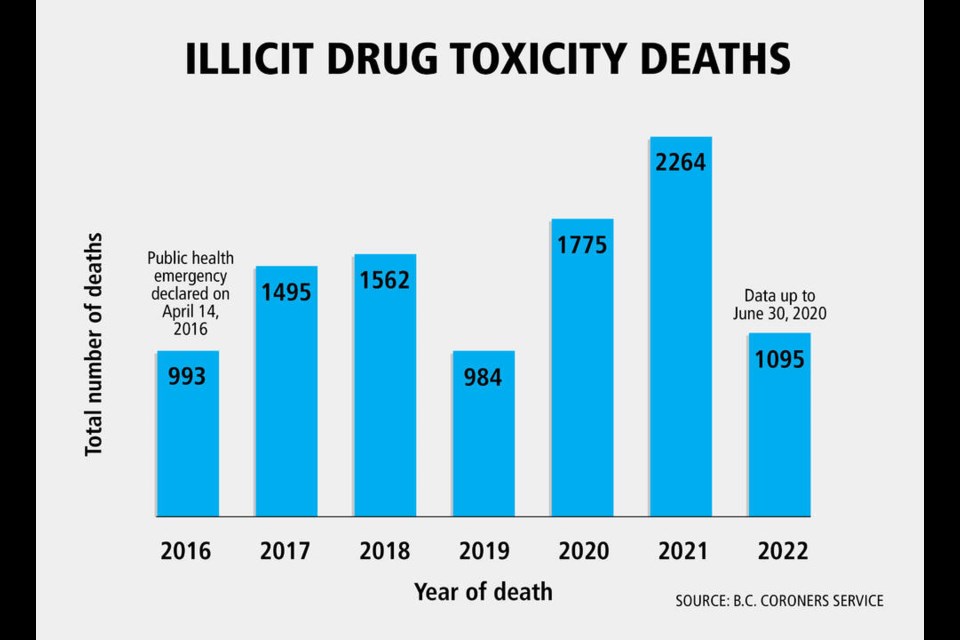Toxic drugs including fentanyl overdoses continue to claim thousands of British Columbians as the deadly pandemic rages on. Preliminary reporting released by the BC Coroners Service on Wednesday confirms that toxic, unregulated drugs claimed the lives of at least 2,511 people in British Columbia in 2023, the largest number of drug-related deaths ever reported to the agency. “Tragically, toxic, illicit drugs are continuing to cause unprecedented numbers of deaths across our province,” said Lisa Lapointe, chief coroner. “This crisis, driven primarily by unregulated fentanyl, has cost our province dearly in the loss of much-loved and valued members of our communities. We cannot bring our deceased loved ones back, but we can and must do much more to protect the lives of tens of thousands of our family members, friends and colleagues still at risk.”
By DESIBUZZCanada Staff
VICTORIA – Toxic drugs including fentanyl overdoses continue to claim thousands of British Columbians as the deadly pandemic rages on.
Preliminary reporting released by the BC Coroners Service on Wednesday confirms that toxic, unregulated drugs claimed the lives of at least 2,511 people in British Columbia in 2023, the largest number of drug-related deaths ever reported to the agency.
“Tragically, toxic, illicit drugs are continuing to cause unprecedented numbers of deaths across our province,” said Lisa Lapointe, chief coroner. “This crisis, driven primarily by unregulated fentanyl, has cost our province dearly in the loss of much-loved and valued members of our communities. We cannot bring our deceased loved ones back, but we can and must do much more to protect the lives of tens of thousands of our family members, friends and colleagues still at risk.”

Mental Health and Addictions Jennifer Whiteside said the province remains committed to tackling the deadly toxic drugs pandemic.
“Today, as we reflect on the year behind us, our hearts are heavy with the loss of 2,511 people in British Columbia to toxic drugs. Each of these lives was precious and important, each with their own story, their own dreams and people who love them. They were part of our community, and their loss is felt deeply by us all.
“My commitment to ending this crisis is unwavering. Our government is taking action to strengthen mental-health and addiction services across the spectrum of needs – from early intervention and prevention, to housing, to treatment and recovery. Our goal is to ensure that accessible, effective care is there for everyone, right when they need it.

The total number of lives lost in 2023 equates to an average of 6.9 deaths per day and is 5% more than the previous high of 2,383 deaths recorded a year earlier in 2022. About seven in every 10 decedents were aged between 30 and 59, and more than three quarters were male. Notably, while rates of death increased in most age groups, there were declines in rates among persons aged 19-29 and those under 19 years. The provincial rate of death for the year was 45.7 per 100,000 residents.
As has been the case throughout the public health emergency, no area of B.C. was spared the devastation caused by toxic drugs in 2023. The Vancouver-Centre North local health area, which includes Vancouver’s Downtown Eastside, reported a rate of death more than 12 times greater than the provincial average. The next highest rates were observed in Hope, Alberni/Clayoquot, Terrace and Greater Campbell River. Four of the province’s five regional health authorities saw record-high numbers and rates of death.
Toxicological testing confirms that illicit fentanyl continues to drive the toxic-drug crisis. Fentanyl and its analogues were by far the most regularly detected substances, appearing in more than 85% of test results conducted in 2023. The Coroners Service continues to monitor closely for the presence of prescribed safer-supply medications in its testing, with hydromorphone detected in about 3% of tests.

Unregulated drug toxicity is the leading cause of death in British Columbia for persons aged 10 to 59, accounting for more deaths than homicides, suicides, accidents and natural disease combined. The lives of at least 13,794 British Columbians have been lost to unregulated drugs since the public-health emergency was first declared in April 2016.
“As we approach the eighth anniversary of the declaration of the public-health emergency that has cost so many lives across B.C., our province needs a co-ordinated, evidence-based response that is commensurate with the scale of this health crisis,” Lapointe said. “Deaths due to drug toxicity are preventable, and I urge our political leaders at all levels to collaborate on a thoughtful, comprehensive plan that puts people first.”
Additional key preliminary findings are below. Data is subject to change as additional toxicology results are received:
* The number of unregulated drug deaths in November (220) and December (219) equates to about 7.2 deaths per day.
* The townships experiencing the highest number of unregulated drug deaths in 2023 were Vancouver, Surrey and Greater Victoria.
* By health authority in 2023, the highest number of unregulated drug deaths were in Vancouver Coastal and Fraser Health Authorities (725 and 693 deaths, respectively), making up 56% of all such deaths in 2023. The highest rates were in Northern Health (67 deaths per 100,000 individuals) and Vancouver Coastal Health (56 per 100,000).
* By Health Service Delivery Area in 2023, the highest rates were in Vancouver, Northern Interior, Central Vancouver Island, North Vancouver Island and Northwest.
* In 2023, 80% of unregulated drug deaths occurred inside (47% in private residences and 33% in other inside residences including social and supportive housing, SROs, shelters, and hotels and other indoor locations) and 19% occurred outside in vehicles, sidewalks, streets, parks, etc.
* Smoking was the most common mode of consumption in 2023 with 65% showing evidence of smoking followed by injection (14%), nasal insufflation (14%) and oral (4%).
* One death has occurred at an overdose prevention site.
* There is no indication that prescribed safer supply is contributing to unregulated drug deaths.
















11 Comments
MM88
3 months agoVới giao diện mượt mà và ưu đãi hấp dẫn, MM88 là lựa chọn lý tưởng cho các tín đồ giải trí trực tuyến.
MM88
3 months agoKhám phá thế giới giải trí trực tuyến đỉnh cao tại MM88, nơi mang đến những trải nghiệm cá cược thể thao và casino sống động.
iwin
3 months agoiwin – nền tảng game bài đổi thưởng uy tín, nơi bạn có thể thử vận may và tận hưởng nhiều tựa game hấp
Auburn Hair
3 months agoI found this very helpful and will be sharing it with my friends.
Регистриране
3 months agoThank you for your sharing. I am worried that I lack creative ideas. It is your article that makes me full of hope. Thank you. But, I have a question, can you help me? https://accounts.binance.com/hu/register-person?ref=IQY5TET4
MM88
3 months agoVới giao diện mượt mà và ưu đãi hấp dẫn, MM88 là lựa chọn lý tưởng cho các tín đồ giải trí trực tuyến.
MM88
3 months agoKhám phá thế giới giải trí trực tuyến đỉnh cao tại MM88, nơi mang đến những trải nghiệm cá cược thể thao và casino sống động.
Kuwin
3 months agokuwin sở hữu kho game đa dạng từ slot đến trò chơi bài đổi thưởng, mang đến cho bạn những giây phút giải trí tuyệt vời.
MM88
3 months agoKhám phá thế giới giải trí trực tuyến đỉnh cao tại MM88, nơi mang đến những trải nghiệm cá cược thể thao và casino sống động.
binance
2 months agoYour point of view caught my eye and was very interesting. Thanks. I have a question for you.
fdertol mrtokev
1 week agoWow! Thank you! I permanently needed to write on my website something like that. Can I include a fragment of your post to my blog?